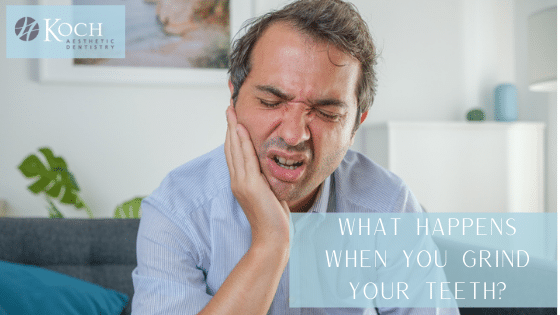
19 Nov What Happens When You Grind Your Teeth?
It’s not unusual for individuals to clench or grind their teeth from time to time. However, if this habit becomes more prevalent, chronic teeth grinding (the medical term is bruxism) can result in serious issues like tooth cracks, headaches, TMJ, and more. Find out more about the dangers of teeth grinding and what you can do to stop doing it in this article.
What is Teeth Grinding?
Teeth grinding (or bruxism) is a condition in which you grind, gnash, or clench your teeth. Although teeth grinding can happen during the day if you are feeling anxious or stressed – it most often occurs in your sleep.
Sleep bruxism is usually caused by sleep disorders like sleep apnea, stress, an abnormal bite, or missing and crooked teeth.
Why Is Teeth Grinding Harmful?
Although some people may never come to a point where they need to treat their teeth grinding, others may suffer serious consequences like tooth fracturing, tooth loosening, and even loss of teeth. In severe cases, chronic grinding can reduce healthy teeth to stubs and may require root canals, bridges, crowns, and even dentures.
In addition to dental issues, chronic teeth grinding can also cause headaches and Temporomandibular Joint Disorders (TMD, TMJ). And last but not least, severe and chronic teeth grinding can change the shape of your teeth, your jaw, and even the way you look.
Symptoms of Chronic Teeth Grinding
The following are some symptoms associated with teeth grinding:
- Teeth grinding or clenching that is loud enough to wake up your sleep partner
- Flattened, fractured, or loose teeth
- Worn tooth enamel
- Tooth pain or sensitivity
- Tired or tight jaw muscles
- Jaw, neck, or face pain
- Dull headache starting in the temples
- Damage from chewing on the inside of your cheek
- Sleep disruption
If you notice any of these symptoms, it might be a good idea to discuss them with your dentist.
How Do I Know if I Grind My Teeth?
Because most teeth grinding happens at night, it can often be tricky for you to notice and know for sure that you are doing it. Luckily, your dentist will be able to tell if you are severely grinding your teeth by examining the teeth’s surface.
This is why it’s important to keep up with your regular dental cleaning appointments. Should your dentist notice that you are causing damage to your teeth and jaw by grinding, he can come up with a treatment plan to help minimize the damage.
Dr. Koch may suggest that you wear a nightguard during your sleep to protect your teeth. If stress is the cause of your teeth grinding, Dr. Koch may discuss stress reduction techniques with you. And in rare cases, medications like muscle relaxants could be prescribed to ease the severity of your grinding.
Koch Aesthetic Dentistry in Birmingham, Alabama
Teeth grinding can lead to more serious issues like headaches, TMJ, and even tooth loss. If you suspect that you may be grinding your teeth, or if you experience newly occurring headaches and changes in your bite, don’t hesitate to reach out to us. Please contact us today to find out more about teeth grinding and our available treatments.


